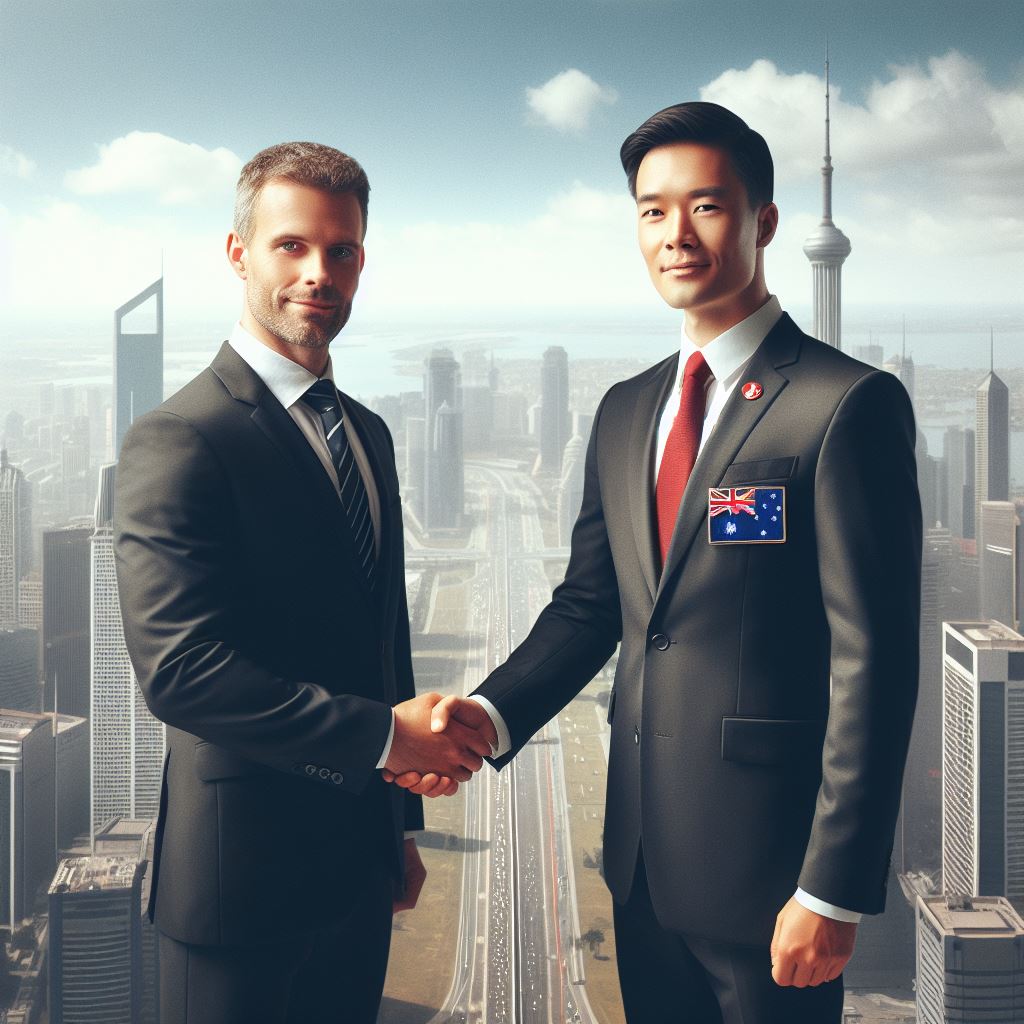Introduction
In the complex landscape of global affairs, the realms of diplomacy and public service emerge as linchpins, steering the course of nations and shaping international relations.
Diplomacy, with its intricate dance of negotiation and collaboration, is a cornerstone of modern governance, playing a pivotal role in fostering peace, resolving conflicts, and advancing shared interests.
Intriguingly intertwined, diplomacy and public service stand as dynamic forces that propel nations towards cooperation and understanding.
The individuals who engage in these arenas become architects of change, influencing policies and shaping the narratives that define a nation’s position on the global stage.
In an era characterized by interconnectedness and interdependence, the relevance of diplomacy has never been more pronounced.
The intricate web of international relations demands adept diplomats who can navigate cultural nuances, geopolitical complexities, and emerging global challenges.
Diplomacy, far from being confined to traditional statecraft, has evolved to encompass a broader spectrum, including economic diplomacy, public diplomacy, and digital diplomacy, underscoring its multifaceted significance in today’s world.
This blog post embarks on a comprehensive exploration, peeling back the layers of diplomacy and public service to reveal their profound impact on the contemporary world.
From dissecting the essential skills of effective diplomats to examining case studies that highlight diplomatic successes, we will traverse the expansive terrain of this critical domain.
By the post’s summary, readers will gain a nuanced understanding of the intricate dance that defines diplomacy, recognizing its pivotal role in shaping the global narrative and steering nations towards collective progress.
Join us on this enlightening journey into the heart of diplomacy and public service, where every negotiation, every interaction, holds the potential to shape the destiny of nations.
What is diplomacy?
Diplomacy, with its purpose of promoting peaceful relations and preventing conflicts, plays a crucial role in today’s interconnected world.
By understanding the definitions, responsibilities, and skills involved in diplomacy, individuals can appreciate its significance and potential impact.
Let us explore each aspect of diplomacy in greater detail:
Diplomacy and Its Purpose
Diplomacy is the art and practice of negotiating and maintaining relationships between nations or groups. Its purpose is to facilitate dialogue, resolve conflicts peacefully, and promote cooperation for mutual benefit.
Through diplomacy, nations can address common challenges such as climate change, security threats, and trade disputes. It provides a framework for countries to engage with one another, build trust, and work towards shared goals.
Roles and Responsibilities of Diplomats
Diplomats, as representatives of their nations, carry out various roles and responsibilities:
- Negotiators: Diplomats engage in diplomatic negotiations to resolve disputes, establish agreements, and protect their country’s interests.
- Representatives: They represent their country at international conferences, forums, and summits, advocating for their nation’s positions.
- Information Gatherers: Diplomats collect and analyze information about foreign policy, economic trends, and global developments, providing valuable insights to policymakers.
- Advisors: They offer advice and recommendations to government officials on foreign policy matters, helping shape their nation’s strategy.
- Peacekeepers: Diplomats contribute to peacekeeping efforts, mediating conflicts, and fostering reconciliation between conflicting parties.
Importance of Negotiation and Communication in Diplomacy
Negotiation and communication are essential components of effective diplomacy:
Negotiation
- Negotiation enables diplomats to find compromises, resolve disagreements, and bridge differences between nations.
- It allows conflicting parties to achieve mutually beneficial outcomes, preventing the escalation of tensions towards armed conflicts.
- Through negotiation, diplomats can reconcile conflicting interests and find diplomatic solutions to complex issues.
Communication
- Effective communication helps diplomats understand different perspectives, promote understanding, and build trust among nations.
- It involves clear articulation of policies, active listening, and the ability to convey messages across cultural and linguistic barriers.
- Diplomats use various forms of communication, including public speeches, diplomatic notes, and private meetings, to convey their country’s positions.
In fact, diplomacy serves as a crucial tool for nations to navigate the complex global landscape, resolve conflicts, and foster cooperation.
Understanding the definition, roles, and skills involved in diplomacy allows individuals to appreciate its significance and contribute effectively to international relations.
Read: Understanding Public Sector Pay Scales
Skills and qualities for diplomacy
Cultural awareness allows diplomats to bridge cultural gaps and foster mutual understanding between nations.
Adaptability ensures diplomats can navigate political and cultural complexities in ever-changing international landscapes.
Emotional intelligence helps diplomats build trust and rapport, crucial for effective diplomacy.
Essential Skills
- Effective communication plays a vital role in diplomacy as it fosters understanding and builds trust.
- Negotiation skills enable diplomats to find common ground and create mutually beneficial agreements.
- Problem-solving abilities allow diplomats to analyze complex situations and devise creative solutions.
For instance, during peace negotiations, effective communication ensures all parties’ concerns are addressed, preventing misunderstandings.
Negotiation skills are essential for diplomats to navigate complex political landscapes and broker successful agreements.
Problem-solving allows diplomats to address global challenges like climate change by finding innovative, sustainable solutions.
Important Qualities
- Cultural awareness helps diplomats understand and respect different customs, traditions, and beliefs.
- Adaptability allows diplomats to navigate unfamiliar environments and adjust their strategies accordingly.
- Emotional intelligence enables diplomats to manage their emotions and empathize with others.
Cultural awareness plays a significant role in promoting cross-cultural collaboration, leading to fruitful international relationships.
Adaptability is crucial when diplomats encounter diverse cultures and must navigate potential cultural differences.
Emotional intelligence enables diplomats to forge strong connections with foreign leaders, fostering diplomatic success.
Contributions to Successful Diplomacy
- Effective communication promotes peaceful dialogue and facilitates the resolution of conflicts.
- Negotiation skills help diplomats reach compromises that satisfy the interests of all parties involved.
- Problem-solving abilities enable diplomats to find innovative solutions to complex global issues.
In summary, essential skills like effective communication, negotiation, and problem-solving are critical tools for diplomats.
Important qualities such as cultural awareness, adaptability, and emotional intelligence enhance their diplomatic effectiveness.
These skills and qualities contribute to successful diplomacy by fostering understanding, resolving conflicts, and building strong international relationships.
Your Personalized Career Strategy
Unlock your potential with tailored career consulting. Get clear, actionable steps designed for your success. Start now!
Get StartedRead: Top Skills Needed in Government Jobs
Diplomatic careers in public service
Various career options in the public service sector that involve diplomacy
- Foreign service officer: represent the country’s interests abroad through diplomacy and negotiation.
- International relations specialist: analyze and evaluate foreign policies, build relationships, and negotiate treaties.
- Political analyst: study international political systems, conduct research, and provide policy recommendations.
Requirements and qualifications for these career paths
- Strong communication and interpersonal skills are crucial for effective diplomacy.
- Educational background in international relations, political science, or a related field is often required.
- Foreign language proficiency is highly desirable, especially in critical regions.
- Ability to adapt to diverse cultures, think critically, and make quick decisions in high-pressure situations.
Insights into the day-to-day responsibilities and challenges faced in diplomatic roles within public service
- Representing the country’s interests in negotiations, discussions, and diplomatic meetings.
- Building and maintaining relationships with foreign officials, diplomats, and international organizations.
- Analyzing political situations and providing recommendations to government officials.
- Handling crises, conflicts, and resolving disputes through diplomatic channels.
- Monitoring and reporting on developments in foreign countries that could impact national interests.
- Advocating for policy changes and promoting national interests in international forums.
- Negotiating and implementing treaties, agreements, and trade deals to benefit the country.
- Working long hours, dealing with different time zones, and being available for emergencies.
- Managing cultural differences and navigating complex political landscapes.
- Maintaining confidentiality and handling sensitive information with utmost professionalism.
In review, diplomatic careers within public service offer diverse opportunities to represent and promote a country’s interests.
Read: Public Service Paths: Your Guide to Success

Learn More: Diplomatic Roles: What Do They Entail?
Discover More: Community Outreach by Firefighters
Learn More: Diversity in Australia’s Police Forces
Steps to pursue a career in diplomacy and public service
The educational requirements and recommended degrees
- Research the educational requirements for entry-level positions in diplomacy and public service.
- Seek a relevant bachelor’s degree in fields such as international relations, political science, or public administration.
- Consider pursuing a master’s degree in a related field to enhance your knowledge and qualifications.
- Stay updated on current affairs and global issues through continuous learning and self-education.
Importance of internships, networking, and gaining practical experience
- Seek internships with diplomatic missions, governmental agencies, or international organizations.
- Gain practical experience by volunteering or working in non-profit organizations related to international affairs.
- Attend networking events, conferences, and workshops to connect with professionals in the field.
- Build relationships with mentors who can provide guidance and recommendations for career advancement.
Tips for preparing a compelling application and acing interviews
- Craft a strong resume highlighting relevant coursework, language skills, and international experiences.
- Write a compelling cover letter showcasing your passion for diplomacy and public service.
- Tailor your application materials to each specific organization or position you apply to.
- Prepare for interviews by researching the organization, practicing potential interview questions, and showcasing your interpersonal skills.
- Showcase your cross-cultural competence and adaptability during the interview process.
- Highlight your problem-solving skills, critical thinking abilities, and ability to work under pressure.
Pursuing a career in diplomacy and public service requires a strong educational foundation, practical experience, and effective application strategies.
By focusing on these key steps and continuously improving your skills, you can increase your chances of success in this rewarding field. Remember to stay dedicated, network with professionals, and seize opportunities to learn and grow.
Good luck on your journey towards a meaningful career in diplomacy and public service!
Read: Day in the Life of an Aussie Public Servant
Challenges and rewards of a diplomatic career
Potential challenges and obstacles diplomats might encounter
- Complex international issues that require careful navigation and negotiation.
- Evolving political landscapes that demand constant adaptation and flexibility.
- Cultural differences and language barriers that can hinder effective communication.
- High-pressure situations that demand quick thinking and decision-making.
- Security risks and the need to ensure personal safety in unstable regions.
- Long working hours, extensive travel, and time away from family and friends.
- Balancing national interests with diplomatic goals, often in the face of conflicting priorities.
- Negotiating with tough counterparts and overcoming resistance to reach agreements.
- Managing diplomatic crises and finding peaceful resolutions to conflicts.
- Maintaining confidentiality and handling sensitive information with utmost discretion.
The importance of resilience, adaptability, and maintaining a global perspective
- Resilience is crucial for diplomats to overcome setbacks and bounce back from challenges.
- Adaptability allows diplomats to navigate changing circumstances and embrace new approaches.
- Maintaining a global perspective helps diplomats understand diverse cultures, values, and perspectives.
- Global challenges require diplomats to think beyond national interests and collaborate with other nations.
- Being open-minded and receptive to different ideas enables effective diplomacy and problem-solving.
- Diplomats must stay informed about global issues and adapt their strategies accordingly.
- Building relationships and networks is essential for effective diplomacy and international cooperation.
- Respecting cultural differences and demonstrating cultural intelligence fosters diplomatic success.
- Being flexible and adjusting strategies to different political climates is key for diplomatic effectiveness.
- Maintaining composure and professionalism in stressful situations is crucial for successful diplomacy.
Rewards and personal fulfillment in diplomacy and public service
- Contributing to the promotion of peace, stability, and international cooperation.
- Making a positive impact on people’s lives through diplomatic negotiations and agreements.
- Advancing national interests and representing a country on the global stage.
- Opportunities to work on diverse and complex issues, including human rights and climate change.
- The privilege of representing one’s country and engaging with influential individuals and leaders.
- Experiencing different cultures, languages, and customs while living and working abroad.
- Building lasting relationships with colleagues, counterparts, and foreign partners.
- Continuous learning and personal growth through exposure to diverse ideas and perspectives.
- Opportunities for career advancement and professional development within diplomatic organizations.
- Being part of a community of dedicated professionals working towards the common good.
A diplomatic career is both challenging and rewarding. Diplomats face various obstacles that demand resilience, adaptability, and a global perspective.
However, the personal fulfillment that comes with contributing to international relations, making a positive impact, and experiencing diverse cultures makes it a highly rewarding profession.
Gain More Insights: Political Campaigning in Australia: A Guide
Learn More: The History of Firefighting in Australia
Conclusion
In recapitulating the multifaceted exploration within this blog post, we have delved into the dynamic realm of medical technology salaries in Australia, unraveling the intricate interplay between technological innovation and the economic landscape of healthcare.
Throughout our journey, we deciphered the pivotal role of medical technology in revolutionizing healthcare, enhancing diagnostic precision, and fostering targeted therapeutic interventions.
Our focus then shifted to the financial dimension, dissecting the nuanced factors influencing medical tech salaries in Australia.
From educational qualifications to professional experience, we navigated the varied elements shaping the remuneration structures within this crucial sector.
As we conclude, we extend an earnest encouragement to our readers to contemplate a career in diplomacy and public service.
The transformative impact of diplomatic efforts in fostering international relations and resolving global challenges cannot be overstated.
Consider joining the ranks of those dedicated to shaping a world built on collaboration, understanding, and effective governance.
For those eager to delve deeper into the realms of diplomacy and public service, we provide a collection of additional resources and further reading materials.
These sources offer a wealth of insights, spanning from diplomatic protocols to the intricacies of public policy.
Knowledge is a powerful tool, and these resources serve as gateways to a more profound understanding of the dynamic and ever-evolving landscapes of diplomacy and public service.
In essence, this blog post serves as a catalyst for thought and action, inviting readers to not only ponder the intricacies of medical tech salaries but also to explore the possibilities of contributing to global progress through careers in diplomacy and public service.




